- Home
- John Barth
The Floating Opera Page 4
The Floating Opera Read online
Page 4
“I agree, if that’s how you want it,” I said sedately. “You were the finest thing in the world.”
She cheered up a lot, then. She went to the icebox for beer—I noticed there was at least fifty pounds of ice inside—and when I came up behind her, held her against me, and nuzzled the back of her neck, she laughed and pressed my hands more tightly against her with her own.
“I don’t know how I’ll be able to face Harrison,” I said, in order to please her.
“Oh, you mustn’t be embarrassed, Toddy. He’s wonderful about this. He was as eager as I was. He really thinks you’re fine.”
“He’s amazing,” I said. She seemed afraid that I wouldn’t appreciate his marvelousness. “He’s a regular saint.”
“He admires you a lot.” Her back was toward me while she opened the beer.
“But he’s better in every way than I am,” I declared to the calendar on the wall. “How can I ever pay him back?”
Now I confess that this last was a loaded question; barrister that I am, I was curious to learn the extent to which Harrison had suggested to his wife that she go to bed with his friend.
“He doesn’t expect any payment,” she assured me. “I mean, I don’t either. You mustn’t feel obliged at all, Toddy. The thing is to not make much of it; it was just for the pleasure of it; that’s all.”
“I can’t believe that any man could go on liking another man, though, after that,” I said doubtfully.
“I swear he will, Toddy!” Jane cried, very urgently for one determined to make light of the whole matter. “How can I convince you? Honest, it was as much his idea as mine!”
I shook my head to indicate either the difficulty anyone might have in comprehending such an unorthodox situation, or the awe that an ordinary, unthinking, weak-willed mortal such as myself necessarily felt before such saintly generosity as Harrison Mack’s.
“Cheer up,” Jane smiled, and kissed me on the nose as she handed me my beer. I was certain my attitude had been the best possible one. She was in control, sheltering and encouraging me. Somewhat selfconsciously, but apparently for my benefit, she slipped off the robe she’d covered herself with and began donning lithely the bathing suit she’d stripped off to come to me earlier. The show, I supposed, was part of the gift from Saint Harrison. It was a dazzlingly good show, and I drank it in with my beer.
After I’d calmed a little from the shock of being seduced, I sat in an old glider on the little screened porch of the cottage to watch the Choptank through the pines. Jane came through, smiled at me as though to say again, “Please don’t worry, now; I swear Harrison approves,” and walked down the lawn and out on the pier to the sailboat. I watched her then with pleasure as she pumped the bilge, sponged the hull and deck, and bent the mainsail and jib to the spars. Everything she did was graceful, efficient, and lust-provoking. I shook my head in astonishment at the whole business.
I heard the car drive up, and a moment later Harrison entered through the rear of the cottage. He made a noisy business of putting the unnecessary ice away, and after a while came out on the porch with me, handed me yet another beer, and sat on the glider. He was, of course, embarrassed, and despite himself made an exaggerated show of everything: lighting his cigarette and mine, taking deep draughts of the beer, stretching out his legs, sighing, yawning. No question but that he knew very well I had made love to his wife. We rather avoided looking either at each other or at Jane, whose rangy body was much before us. I smiled at the notion of Harrison’s pulling a revolver from his shirt and laying me out with three slugs of lead. I began recalling all the violent consequences of adultery I’d ever heard of as a lawyer and a reader of tabloid newspapers. Was this hospitable prostitution something novel, or did one simply never hear of it?
“Well,” Harrison croaked, in a voice that I believe was meant to be hearty, “we can either keep quiet about it, like gentlemen, or talk frankly about it, like I’d like to, to make sure we understand each other.”
“Sure,” I said, and began peeling the label off my beer bottle.
“She makes love well, doesn’t she?” Harrison grinned.
“Oh, yes indeed!” I said.
There was a silence that Harrison didn’t let last more than an instant.
“I want you to know it’s all right with me, Toddy,” he said, his voice still unnatural. “I approved of it as much as Janie did. She likes you a lot, you know, and I do too. I think it was a swell idea she had.”
I was certain now that it had been Harrison’s idea.
“Janie and I love each other completely,” he went on, wishing I’d help him. “We’re not stupid enough to be affected by things like jealousy or conventions. [Pause] You can have sexual attractions apart from love. We both enjoy love-making. [Pause] If I was attracted to any girl, Janie wouldn’t be silly enough to object to me going to bed with her, because she knows there wouldn’t be any love in it.”
“Of course not,” I said.
“It’s like playing tennis,” Harrison laughed. “Just for the fun and exercise. Some guys would get jealous if their wife played tennis with another man, or danced with him. Actually, I guess kissing is a more serious offense than love-making, because it’s no fun in itself, but just a symbol of something else.”
I shook my head in apparent awe.
“Don’t feel obligated,” Harrison laughed. “For Christ’s sake don’t thank me for anything. Just enjoy it. The thing is, don’t make too much of it. It gets all out of proportion.”
Well, I wasn’t making anything out of it.
“Are any of us any different than we were?” he went on.
“I am,” I said solemnly. It was clear to me that whether he realized it or not, Harrison very much wanted thanking and being obliged to; I decided to make him feel very good.
“Oh, sure,” he grinned. “But you know what I mean.”
“But you don’t know what I mean,” I said. “It was my first time.”
“What?”
“That’s right.” I stared at my peeled beer bottle. “I was a virgin.”
“No!” he breathed, realizing that this enormous fact was not to be laughed at. “How old? Thirty?”
“Thirty-two,” I said. “I had prostate trouble for a long time.”
Harrison glanced out to where Jane was walking back up the pier toward the cottage.
“Well say,” he said, “I hope we didn’t do anything you didn’t like.” He was extremely impressed and flattered.
“No,” I said. “It was fine, Harrison. Of course I’ve nothing to compare it with.”
“Well listen,” he said quickly, for Jane was coming near. “For Christ’s sake don’t feel obligated to me. I thought it was a swell idea. I did it—we did it—because we like you. And don’t get the idea—I’ve heard of guys like this—don’t get the idea I’m the kind of guy that has to push his wife off on his friends.”
“Of course not.”
“Well, here comes Janie,” he said, relieved. “Cheer up, now. And for Christ’s sake don’t feel obligated.”
“All right,” I said.
The breeze that afternoon was stiff, and a quietude settled on the three of us. For my part, I did a lot of staring at nothing, as though preoccupied with my thoughts. Harrison and Jane assumed that I was meditating on the great thing that had happened to me, and they were flattered and uneasy, and spoke in cheerful voices about nothing. Harrison, I could see, was bursting to tell Jane I’d been a virgin. Both behaved protectively and with exaggerated consideration for my feelings: it was, let me assure you, a real and thoroughgoing generosity in the Macks that I smiled at inwardly—nothing false about it except the manifestations, and that falsification was due to the strained situation, which I was aggravating by my silence. I could pretty much see where the thing was leading. May I explain?
Really, you see, Harrison and Jane were quite ordinary people, only a little more intelligent and a lot better-looking and richer than most. They had few friends, by
their own choice, preferring to be on intimate terms with just one or two people. There was nothing affected in Jane’s warmth—she was naturally disposed to affection—and Harrison’s intelligence, while somewhat disoriented and not really keen, was capable of convincing both of them that most social conventions are arbitrary. Yet I knew Harrison well enough to know that his emotions were often at variance with his intelligence—he realized the irrational nature of race prejudice, for example, but couldn’t bring himself to like Negroes—and I supposed Jane had similar conflicts. Doubtless they’d thought about this move for a long time, each titillated with the adventure; perhaps they’d discussed it in bed together, in the dark, where their embarrassment—or eagerness—wouldn’t show. Neither would want to appear overenthusiastic, I imagine, for fear of making the other suspicious—that Jane was dissatisfied or Harrison perverted, neither of which suspicions was true. I’m sure they’d worked out every detail, savoring the deed before it was committed, imagining my surprise and pleasure, and my gratitude. I really liked Harrison, and for that reason I was sorry he’d initiated the affair, because I anticipated certain unpleasant consequences from it. But it was done: Jane was officially my mistress for a while—I was sure she’d be back for more—and I resolved to enjoy the thing while it lasted, for she was all that a man, shy or otherwise, could want in a bed partner.
These were the things I thought as we rounded Todd Point and sailed on a close reach directly for Sharp’s Island. Jane was at the tiller—an excellent helmsman, of course—I tended the jib sheet, and Harrison lay supine in the bilge beside the centerboard trunk, his feet forward, the mainsheet in one hand and a cigar in the other, talking to Jane, on whose bare feet his head rested. We took a swim when we reached the island, got stung by sea nettles, talked a bit about politics, and smoked cigarettes. After a while I pled fatigue and lay down to sleep on a blanket on the sand. Jane and Harrison declared they were going to walk around the island.
The time came when I felt her hand, but I had heard her returning up the beach, and so lost no manliness through surprise. I pulled her down beside me at once and kissed her.
“Where’s Harrison?” I asked her.
“Other side of the island,” she said, and I had the bathing suit half off her before she could add, “he’s getting firewood.”
“Let’s go in the trees,” she said, a little nervously. “They could see us from Cook’s Point if they had field glasses.”
“Never mind,” I said. “Let’s oblige me.”
“Don’t say that,” she said.
Harrison came back as it was getting dark, dragging after him a roped bundle of firewood, and found us sitting dressed and talking on the blanket. He was not so cheerful as before, and set about silently and busily to build the fire, his stooped back half-accusing me of letting him do all the work. I let him do all the work. He remained morose throughout the rest of the evening and during the run back to the cottage. Jane made some attempt at cheerfulness, but lapsed into silence when she got no response. I watched them benignly, wondering what had happened to everyone’s objectivity.
By next day the mood was gone, replaced by Harrison’s usual cheerfulness; but its existence, though short-lived, was, I thought, indicative of chinks in the saintly armor. Of course, I tend to see significances in everything.
“It was just for the pleasure of it; that’s all,” Jane had told me.
“You can have sexual attractions apart from love,” Harrison had told me.
Yet: “The truth is, I do love you in a way, Toddy,” Jane said a week later in my hotel room. “Not the same way as I love Harrison, but it’s more than just friendship; and it makes love-making more fun, doesn’t it?”
“Of course,” I said.
And: “A woman can love two or several men in the same way at the same time,” Harrison declared after that, one night at dinner at his house, “or in different ways at the same time, or in the same way at different times, or in different ways at different times. The ‘one-and-only-and-always’ idea is just a conventional notion.”
“Of course,” I said.
Nor was I being especially hypocritical, although I’d just as readily agreed earlier to the proposition that love is separable from copulation, and copulation from love. The truth is that while I knew very well what copulation is and feels like, I’d never understood personally what love is and feels like. Are the differences between, say, one’s love for his wife, his mistress, his parents, his cats, his nation, his hobby, his species, his books, and his natural environment differences in kind, or merely in degree? If in kind, are the kinds definable to the point of intelligibility? If in degree, is the necessarily general definition which can cover them all so general as to be meaningless? Is this thing a fact of nature, like thirst, or purely a human and civilized invention? If he is in love who simply decides to say, “I am in love,” then love I’d never known, for often as I’d said, “I am in love,” I’d said it always to women who expected to hear it, never to myself. As for copulation, whether between humans or other sorts of animals, it makes me smile.
Despite which fact, I could assent without qualm to either of the Macks’ sets of propositions, for they speak only of “a person,” not of everybody; who was I to say that “a person” can or cannot divorce love from copulation, when I didn’t comprehend love? That “a person” can or cannot love several others at once, when I didn’t comprehend love? Assenting even simultaneously to contradictory propositions has never especially troubled me, and these of the Macks weren’t simultaneous. I was not and am not interested in the truth or falsehood of the statements.
What I was interested in, when I thought of it now and then in the weeks that followed, was the fact that the Macks had so changed their minds, because it corresponded to my speculations about the course of the affair. I scarcely regarded myself as involved in it at all: my curiosity lay entirely in the character of Harrison and, to a lesser degree, of Jane. When I’d got home that August weekend after losing my chastity, I did a bit of conjecturing, supplementing my conjectures with notes. Here is one of the outlines I wrote of Harrison’s psychic process:
ANTE COITUM FELIX
I Desire for adventure.
II Titillation at idea of extra-marital sex.
III Reluctance to suggest idea to wife.
IV Love for friend—suggests idea of ex.-mar. sex for wife with friend.
V Titillation at idea.
VI Objective discussion with wife of jealousy, adultery, etc.
VII Planning of actual affair betw. friend and wife.
THE ACT
VIII Desperate objectivity: “Don’t feel obligated!”
IX Real wrestling with jealousy, despite intellectual tolerance. Unusual demands on wife’s affections.
X Moodiness at wife’s enjoyment of affair, and refusal to hear of her canceling it.
XI Insistence that wife continue affair with friend, and mounting jealousy when she does.
XII Desultoriness except when wife asks what’s up; then cheerfulness and objectivity, necessarily, or wife will end affair and chance for martyrdom.
Stages I through X, if not XII, were matters of history, easily enough inferred by the time I wrote the list. But I went on as follows:
POST COITUM TRISTE
XIII Wife, to reassure herself, decides she loves friend “in a way.”
XIV Husband doubts friend appreciates enormity of his good fortune.
XV Both h. & w. become more demanding of friend; he is their property. Jealous of him, if not of each other.
XVI Want declarations of love from friend.
XVII Friend refuses— friendship cools.
XVIII Active dislike of friend for his ingratitude.
XIX Suspension of affair.
XX Period of mutual silence: h. & w. love each other more than before, in self-defense.
This was as far as I could see with any certainty, but from there I outlined a number of possible directions that the busin
ess might take:
I Permanent disaffection (probable)
II Resumption of affair on original basis (quite possible)
III Resumption of affair on part of wife, against husband’s will (very doubtful)
IV Resumption of qualified affection, but no more sex (quite possible)
I made other outlines, as well, in the days that followed, but this one, at least as far as Stage XX, proved the most accurate. First of all, as I have already suggested, when the horns on Harrison’s brow were but a few days old, Jane and I contrived to lengthen them a bit, whether at his instigation or not I can only guess. I had returned to my room for a nap after lunch, as was my practice even then. She was waiting for me, and not long afterwards she said, “The truth is, I do love you in a way, Toddy. Not the same way as I love Harrison, but it’s more than just friendship; and it makes love-making more fun, doesn’t it?”
“Of course,” I said.
I was sitting on the edge of my bed. She was standing directly in front of me. I believed she wanted me to tell her that I loved her.
“I love you,” I said. I was right: she did want to hear it.
During the next year or so the affair went on strongly. Janie actually began spending every Tuesday and Friday night in my room—fantastic, so to schedule it!—and Harrison dropped into the office at least twice a day. They insisted that I take dinner with them every night, and Harrison even suggested that I move in with them.
“You can have your old bedroom back,” he said. “I’ve always felt it was the Andrews’ house, and that we were the guests.”
The mention of my old bedroom, where I’d slept from age zero to age seventeen, reminded me of a certain adventure, and I laughed.
“I can’t help it,” Harrison smiled, a little abashed.
“No, no, it’s not that,” I grinned. But I turned his proposal down, to be sure. Incredible! Yet he was, I’m sure, more manly in every way than I—it was a matter of sheer generosity, I swear!

 Final Fridays
Final Fridays Where Three Roads Meet: Novellas
Where Three Roads Meet: Novellas Every Third Thought: A Novel in Five Seasons
Every Third Thought: A Novel in Five Seasons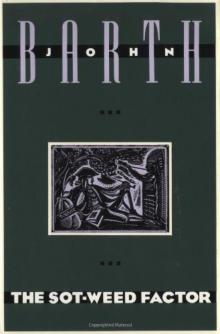 The Sot-Weed Factor
The Sot-Weed Factor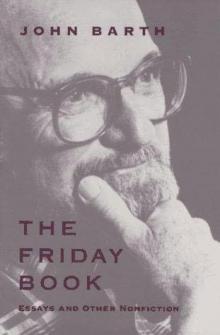 The Friday Book
The Friday Book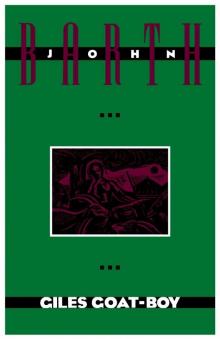 Giles Goat Boy
Giles Goat Boy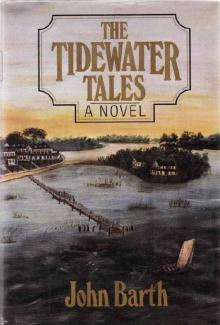 The Tidewater Tales
The Tidewater Tales The Development
The Development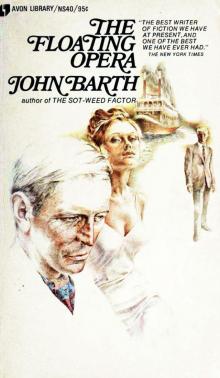 The Floating Opera
The Floating Opera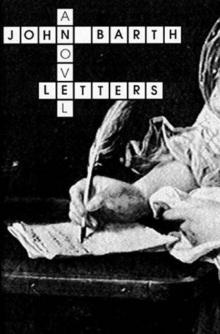 Letters
Letters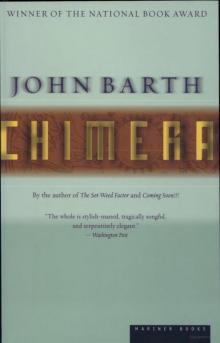 Chimera
Chimera Where Three Roads Meet
Where Three Roads Meet Every Third Thought
Every Third Thought